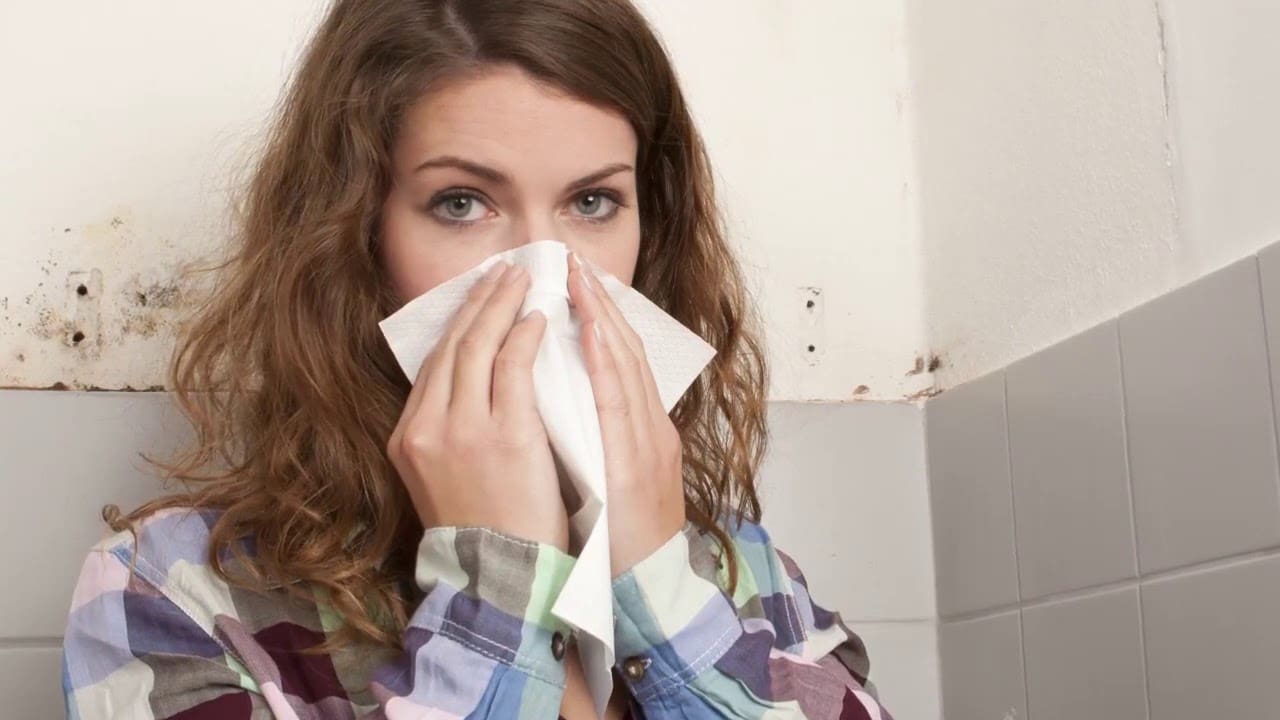The Health Risks Of Mold Exposure
Mold exposure in Northern Indiana can cause health issues. This is especially true for people with allergies or respiratory conditions. Symptoms include sneezing, a runny nose, congestion, itchy eyes, and coughing. They resemble allergy reactions. Respiratory problems like wheezing, shortness of breath, and chest tightness are also frequent. Other symptoms may involve fatigue, headaches, skin rashes, nausea, and dizziness. Other health conditions can cause these symptoms. So, it’s essential to consult a healthcare professional for a proper diagnosis. If mold exposure is suspected, remove the mold right away. You may need to hire a professional, like Pure Air Indiana of Granger, IN.
Common Symptoms Of Mold Exposure
Mold exposure doesn’t affect everyone the same way. Some may experience no symptoms, while others might suffer severe health problems. Here’s a breakdown of the most common symptoms:
1. Respiratory Issues
The most immediate and noticeable impact of mold exposure is often on the respiratory system. Mold spores can irritate the lungs and lead to:
- Chronic coughing or sneezing
- Shortness of breath
- Wheezing
- Nasal congestion
- Sinus infections
These symptoms are especially troublesome for people with asthma. They can worsen their respiratory symptoms. If you’re in Indiana and noticing these issues, it might be time to consider professional mold remediation Indiana services.
2. Allergic Reactions
Many people sensitive to mold will have allergic reactions that resemble hay fever. These include:
- Itchy, watery eyes
- Runny or stuffy nose
- Skin rashes
- Sore throat
The severity of these reactions varies depending on individual sensitivity and the amount of mold present. If you notice these symptoms and suspect mold, contact mold removal company Indiana to assess the situation.
3. Fatigue And Headaches
Mold exposure can take a toll on your energy levels. Many people report feeling constantly tired or experiencing frequent headaches. This is because the immune system is often on overdrive, trying to fight off the mold spores, leading to fatigue and a foggy feeling in your head.
4. Eye And Skin Irritation
Mold spores can also irritate the eyes and skin. You may experience:
- Red, itchy eyes
- Dry, scaly, or itchy skin
- Hives or rashes
These reactions are usually localized. They can appear after direct contact with mold or moldy materials. If these symptoms persist, it’s essential to have mold testing Indiana done to ensure your home environment is safe.
5. Worsening Of Pre-existing Conditions
Mold exposure can worsen symptoms in those with asthma, COPD, or autoimmune disorders. It can trigger asthma attacks or make it harder to breathe.
If you or a family member have these conditions, it’s vital to act quickly and look into professional mold removal Indiana before it gets worse.
| Symptom | Description |
| Respiratory Issues | Chronic coughing, sneezing, wheezing, shortness of breath |
| Allergic Reactions | Itchy eyes, runny nose, skin rashes |
| Fatigue and Headaches | Constant tiredness, foggy feeling, frequent headaches |
| Eye and Skin Irritation | Red, itchy eyes, dry or scaly skin |
| Worsening Pre-existing Conditions | Triggers asthma, worsens COPD, or other respiratory conditions |
When Mold Becomes A Serious Health Threat?
Most mold exposure causes mild symptoms. But, long-term exposure, or exposure to toxic molds like black mold, can cause severe health issues. These include:
- Fungal Infections: In rare cases, people with weak immune systems can develop serious lung infections. These fungal infections can spread to other parts of the body.
- Neurological Problems: Toxic mold may cause memory loss, trouble focusing, and mood swings.
- Lung Disease: Chronic exposure to mold spores can lead to permanent lung damage, especially in children or the elderly.

How You Can Identify Mold In Your Home
So, how can you tell if mold is present in your home? Here are a few signs that mold could be hiding in your living space:
- A musty smell that doesn’t go away
- Discolored spots on walls, ceilings, or floors
- Water damage or leaking in the house
- High humidity or condensation on windows
- Frequent allergy-like symptoms in specific areas of the home
If you notice any of these, it’s essential to take immediate action by contacting mold remediation services Indiana.
Related: What Are Common Signs Of Mold On Walls?
Steps To Take If You Suspect Mold Exposure
If you believe mold is affecting your health or home, here’s a simple action plan to follow:
1. Get Mold Testing Done
The first step is to confirm whether mold is present and, if so, what type. Mold testing Indiana services can provide a thorough assessment of your home to detect mold.
2. Hire A Professional Mold Removal Company
Once mold is confirmed, it’s time to call in the experts. Professional mold remediation Indiana services ensure that mold is safely and effectively removed. They have the tools and expertise to tackle even the toughest mold infestations.
3. Prevent Mold From Returning
Mold can return if the underlying cause is not addressed. After mold removal, take steps to prevent future growth:
- Fix any leaks or water damage promptly
- Use a dehumidifier in damp areas like basements or bathrooms
- Ensure proper ventilation in your home
- Regularly inspect areas prone to moisture buildup
By being proactive, you can avoid future mold issues and keep your home healthy.
Understanding Mold Remediation
Living in Indiana means dealing with varying weather conditions, from humid summers to cold, wet winters. These fluctuations can create the perfect environment for mold growth. If you need mold remediation in Indiana, act now. It's vital to stay ahead of the problem.
Mold remediation is the process of identifying, removing, and preventing mold in your home. Professionals will first assess the mold infestation. Then, they will safely remove it using specialized equipment. After removal, they’ll advise on how to keep your home mold-free, so you won’t have to worry about it creeping back into your life.
Related: How Much Does Mold Remediation Cost?
Important Tips To Keep Your Home Mold-Free And Healthy
Now that you’re aware of the symptoms of mold exposure and how it can impact your health, you might wonder what you can do to keep your home mold-free. Here are a few tips:
- Control Humidity: Keep indoor humidity levels below 50%. You can use air conditioners or dehumidifiers, especially in Indiana’s humid months.
- Proper Ventilation: Ensure good airflow in bathrooms, kitchens, and laundry rooms, where moisture tends to build up.
- Fix Leaks Promptly: Any signs of leaks or water damage should be addressed quickly to prevent mold growth.
- Regular Inspections: Routine checks, especially after storms, can help find mold early.
- Professional Help: Don’t hesitate to call mold remediation services Indiana if you suspect a mold problem. The sooner you address it, the less damage it will cause.
Your Home, Your Health: A Mold-Free & Fresh Home
Mold might be lurking in the shadows, but you don’t have to let it affect your health and happiness. With the right steps, you can protect your family and your home from the dangers of mold exposure. If you need mold remediation services Indiana, act fast. It can make all the difference in ensuring a mold-free environment. By staying informed and taking action when necessary, you can create a home that’s safe, healthy, and comfortable for everyone. Your well-being starts with the air you breathe, so ensure it’s clean and mold-free!


